
Data Science in Finance and Economics
Scope & Guideline
Unlocking the power of data for financial and economic innovation.
Introduction
Aims and Scopes
- Application of Machine Learning and AI:
The journal emphasizes the use of machine learning and artificial intelligence techniques for predictive modeling, risk assessment, and financial decision-making processes. - Time Series Analysis and Forecasting:
A core area of focus is the analysis and forecasting of financial time series data, utilizing various statistical and computational methods to understand market dynamics. - Economic Modeling and Simulation:
Research often explores economic models and simulations to assess financial systems' behavior under different conditions and policy changes. - Interdisciplinary Approaches:
The journal encourages interdisciplinary research that combines insights from finance, economics, data science, and behavioral sciences to enhance understanding of financial markets. - Empirical Studies and Case Analyses:
A significant portion of the publications includes empirical studies that analyze real-world data to validate theoretical models and provide actionable insights.
Trending and Emerging
- Integration of Big Data Analytics:
There is a rising trend in the application of big data analytics in finance, focusing on how large datasets can enhance decision-making and predictive accuracy. - Sustainability and Green Finance:
Emerging research is increasingly exploring the intersection of finance and sustainability, particularly how financial markets can support renewable energy initiatives and sustainable economic practices. - Behavioral Finance and Investor Sentiment:
Studies examining the impact of investor sentiment and behavioral factors on market movements are gaining traction, reflecting a growing interest in the psychological aspects of financial decision-making. - Cryptocurrencies and Alternative Assets:
Research focusing on cryptocurrencies, including their volatility and market dynamics, is becoming a significant theme, driven by the rising interest and investment in digital assets. - Machine Learning in Risk Assessment:
There is a notable increase in studies employing machine learning techniques specifically for risk assessment and management, indicating a shift towards more advanced analytical frameworks.
Declining or Waning
- Traditional Statistical Methods:
There has been a noticeable decrease in the publication of papers focusing solely on traditional statistical methods without incorporating modern computational approaches, such as machine learning. - General Economic Theories:
Research centered on generic economic theories without empirical validation or application to current financial challenges has become less prevalent, as there is a growing preference for data-driven studies. - Basic Risk Management Techniques:
Papers that focus on basic risk management techniques without the integration of advanced analytics or technology are appearing less frequently, suggesting a shift towards more sophisticated methodologies.
Similar Journals
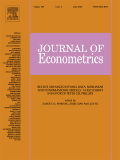
Journal of Econometrics
Elevating Economic Analysis through Rigorous Methodologies.Journal of Econometrics, published by ELSEVIER SCIENCE SA, is a leading journal in the fields of applied mathematics and econometrics, with a commendable reputation established since its inception in 1973. The journal's ISSN 0304-4076 and E-ISSN 1872-6895, reflect its commitment to quality research output, and it enjoys a high impact factor, ranking in the Q1 category for economics and applied mathematics as per the latest 2023 assessments. The journal aims to provide rigorous theoretical developments, empirical analyses, and methodologies in the rapidly evolving discipline of econometrics, thus catering to a diverse audience of researchers, professionals, and students alike. While currently not offered in an open access format, the quality and depth of research articles published within its pages make it a vital resource for anyone interested in the quantitative analysis of economic data. With a strong ranking in Scopus, particularly in the 96th percentile for applied mathematics, Journal of Econometrics continues to be at the forefront of academic inquiry, fostering advancements in both theory and practice within the global economy.
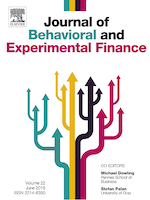
Journal of Behavioral and Experimental Finance
Decoding Financial Behavior for a Better TomorrowJournal of Behavioral and Experimental Finance, published by Elsevier, stands as a premier outlet for groundbreaking research in the realm of finance, particularly focusing on the psychological and behavioral factors that influence financial decision-making. With an ISSN of 2214-6350 and an E-ISSN of 2214-6369, this journal has established itself within the top tier, achieving a Q1 ranking in Finance for 2023, and is currently positioned 10th out of 317 journals in the Scopus category of Economics, Econometrics and Finance, demonstrating a remarkable 97th percentile ranking. Aiming to bridge theoretical advancements with practical applications, the journal encourages submissions that explore innovative methodologies and empirical studies, offering valuable insights for academics, practitioners, and students alike. As a vital resource for those interested in the confluence of psychology and finance, the Journal of Behavioral and Experimental Finance is pivotal in shaping the future of financial research and practice.

Portuguese Economic Journal
Bridging Theory and Application in EconomicsWelcome to the Portuguese Economic Journal, a renowned publication in the field of economics, published by SPRINGER HEIDELBERG. With an ISSN of 1617-982X and flexible access options, this journal serves as a pivotal platform for both established and emerging researchers. Spanning a broad range of topics within Economics, Econometrics, and Finance, the journal has successfully converged from 2005 to 2024, positioning itself in Q3 for Economics and Econometrics and Q2 in Economics, Econometrics and Finance (miscellaneous) as per the latest 2023 category quartiles. It is ranked 68th out of 288 in the Scopus list for General Economics, highlighting its significant place in the academic landscape. Based in Germany, the journal fosters a global dialogue on economic issues, making it an invaluable resource for researchers, professionals, and students seeking to engage with contemporary economic discussions. Join our community as we explore innovative economic theories, data-driven analyses, and practical applications to contribute to the advancement of the field.
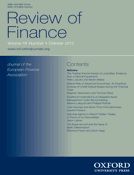
Review of Finance
Pioneering high-quality research in finance and beyond.The Review of Finance, published by Oxford University Press, stands as a premier academic journal in the fields of Finance, Accounting, and Economics. With an ISSN of 1572-3097 and an impressive track record stretching from 2001 to 2024, this journal is consistently recognized for its high-quality research, reflected in its Q1 rankings across key categories, including Accounting, Finance, and Economics and Econometrics. The Review of Finance is dedicated to advancing the understanding of financial phenomena through robust empirical and theoretical insights, making it an essential resource for researchers and professionals alike. Additionally, its strong Scopus rankings, placing it in the top percentiles, highlight its influence and relevance in ongoing academic discourse. Although the journal is not open access, it remains widely accessible through academic institutions, ensuring that its valuable contributions reach an extensive audience. The editorial board invites submissions that promise to further engage the academic community in the dynamic intersections of finance, accounting, and economic research.
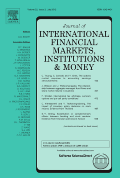
Journal of International Financial Markets Institutions & Money
Advancing Global Financial InsightsThe Journal of International Financial Markets, Institutions & Money, published by Elsevier, serves as a leading platform for the dissemination of high-quality research in the fields of finance, economics, and econometrics. With an impressive impact factor reflected in its status as a Q1 journal in both categories for 2023, it ranks among the top journals, positioned at #47 out of 317 in Finance and #111 out of 716 in Economics. This journal offers a unique focus on the interplay between financial markets and institutions on a global scale, making it an essential resource for scholars, practitioners, and students alike. The journal welcomes innovative theoretical, empirical, and applied research, contributing to an exciting dialogue that shapes the future of international finance. For researchers looking to publish their findings, this journal is committed to rigorously engaging with contemporary financial phenomena, positioning itself as a vital cornerstone of academic and professional discourse.

APPLIED STOCHASTIC MODELS IN BUSINESS AND INDUSTRY
Navigating Uncertainty with Cutting-Edge Stochastic ResearchApplied Stochastic Models in Business and Industry, published by Wiley, is a preeminent journal dedicated to advancing the field of stochastic modeling in various business and industry contexts. With an ISSN of 1524-1904 and an E-ISSN of 1526-4025, this journal serves as a vital platform for researchers and practitioners aiming to leverage stochastic techniques to address complex decision-making and operational challenges. The journal holds prestigious rankings, including Q2 in Business, Management and Accounting, and has converged years spanning from 1999 to 2024. It is distinguished by its wide scope, focusing on all aspects of modeling and simulation, as well as decision sciences and operations research. Although it does not operate as an open-access journal, its significant impact factor and Scopus rankings ensure that the valuable insights published within reach a broad audience. By fostering high-quality research and discourse, Applied Stochastic Models in Business and Industry plays a crucial role in driving innovation and excellence in its fields.
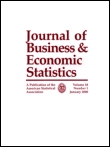
JOURNAL OF BUSINESS & ECONOMIC STATISTICS
Empowering Research through Statistical ExcellenceJOURNAL OF BUSINESS & ECONOMIC STATISTICS is a premier academic journal published by Taylor & Francis Inc, dedicated to disseminating high-quality research in the fields of business, economics, and statistics. With an impressive impact in the academic community, the journal maintains a distinguished Q1 ranking across various categories including Economics and Econometrics, Social Sciences (miscellaneous), and Statistics and Probability, showcasing its relevance and influence in contemporary research. Since its inception in 1983, the journal has served as a vital resource for researchers, professionals, and students seeking insights into quantitative methodologies and their application in the economic domain. While the journal is not currently open access, its rigorous peer-review process ensures that published articles are of the highest scholarly standards. Researchers and practitioners alike will find a rich repository of empirical and theoretical studies that foster knowledge advancement in the intersecting realms of business, economics, and statistical analysis.

Econometrics
Empowering Economists with Open Access InsightsEconometrics, published by MDPI, is a prominent open access journal based in Switzerland, dedicated to advancing research in the fields of economics and econometrics. Since its inception in 2013, this journal has been pivotal in disseminating innovative theories and empirical findings, fostering an engaging dialogue among scholars and practitioners. With an impressive Q2 ranking in the 2023 category of Economics and Econometrics and a solid position at #378 out of 716 in Scopus rankings, it stands as a vital resource for those seeking to enhance their understanding and application of econometric methods. The journal offers immediate open access to its published articles, ensuring that researchers, professionals, and students alike can easily access and contribute to the evolving body of knowledge in this essential discipline. The scope of Econometrics encourages submissions that cover a broad array of topics, making it a dynamic platform for innovative research until 2024 and beyond.

European Journal of Finance
Unlocking the complexities of financial systems and markets.European Journal of Finance is a prestigious publication specializing in the domains of finance, economics, and econometrics, published by Routledge Journals, Taylor & Francis Ltd. Established in 1995, this journal has become a vital resource for researchers, practitioners, and students, contributing significantly to the understanding of financial systems and markets. With its Q1 ranking in the Economics, Econometrics and Finance category, it stands out for its rigorous peer-reviewed articles that explore innovative theories, models, and empirical studies. The journal's impressive Scopus ranking of 35 out of 242 highlights its impact and relevance within the field, with an 85th percentile standing that underscores its importance to current financial research. Although it does not offer open access, the European Journal of Finance remains a cornerstone for those seeking to delve deeper into the complexities of finance, equipped with insights that drive both academic inquiry and practical application.

Quantitative Finance and Economics
Championing Open Access to Vital Economic InsightsQuantitative Finance and Economics, published by the American Institute of Mathematical Sciences (AIMS), is a pioneering open-access journal committed to advancing the fields of finance and economics. Established to disseminate high-quality research, this journal has been an open-access platform since 2017, promoting wider accessibility to vital academic findings. It serves as a crucial resource for researchers and professionals alike, offering valuable insights through rigorous studies in quantitative methods that influence financial and economic decision-making. Although current Scopus rankings indicate emerging challenges, with a rank in the lower percentiles across various categories, Quantitative Finance and Economics strives to gain recognition by bridging theoretical frameworks with practical applications. The journal invites contributions that explore innovative quantitative techniques and their implications in contemporary economic scenarios, thus underscoring its role in shaping discourse and research in this critical sector.